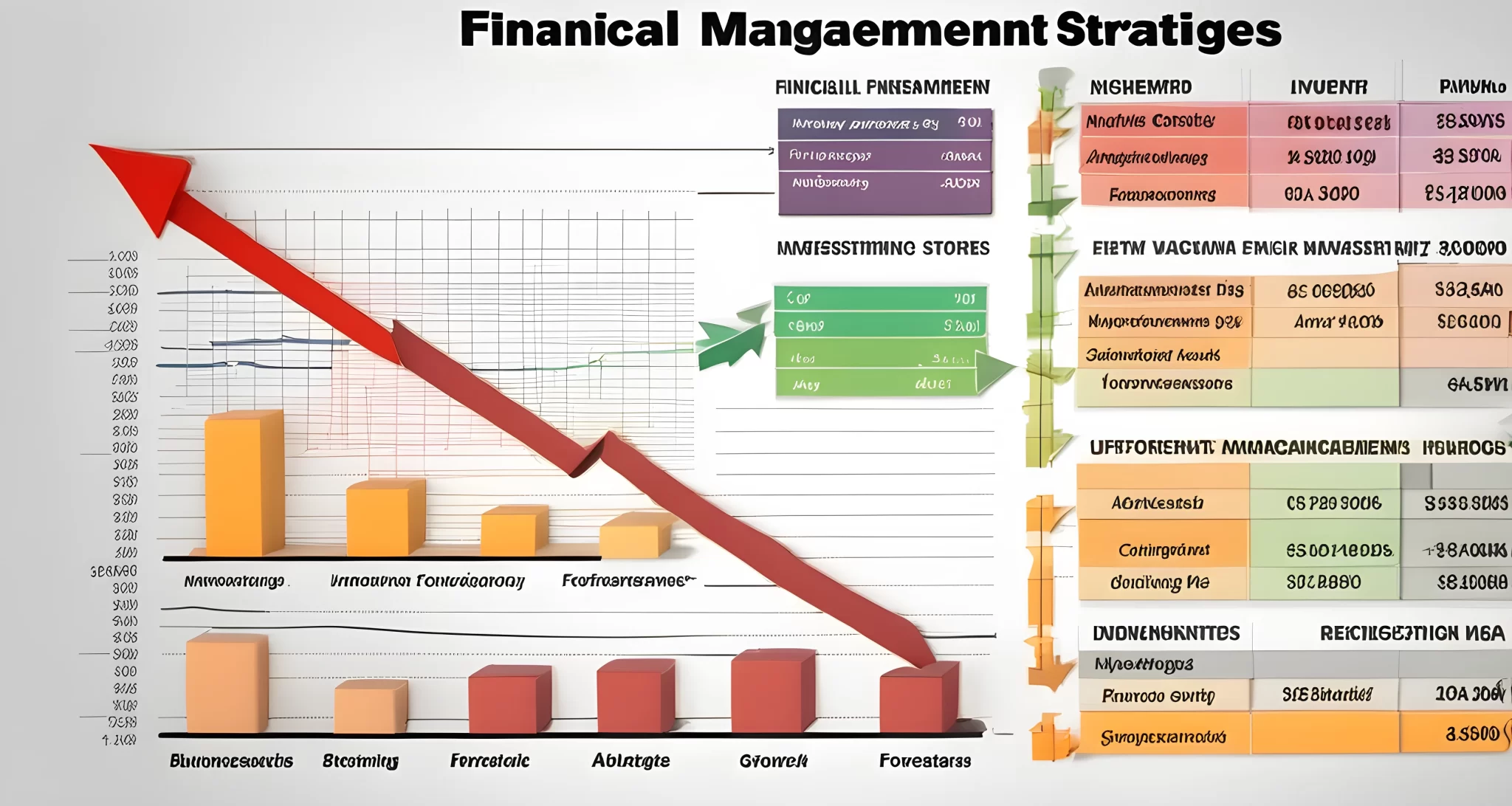Understanding Financial Strategy Challenges
Navigating financial strategy challenges requires a comprehensive understanding of the various obstacles that individuals and businesses face in managing their finances. This includes effective financial planning, diversifying funding sources, optimizing cash flow management, and implementing financial controls. It involves using all resources intentionally to achieve long-term goals and maximize shareholder value.
In our ever-changing market, it is crucial to stay informed and constantly adapt to new opportunities. For more information on identifying and seizing financial opportunities in a changing market, check out our article on Financial opportunities market change.
Strategic financial management plays a critical role in helping individuals and businesses overcome these challenges. By identifying potential risks and developing proactive strategies to address them, financial managers can ensure the stability and growth of their financial portfolios.
For individuals, the challenges in financial management can include budgeting effectively, saving for retirement, and making smart investment decisions. On the other hand, businesses face challenges such as managing working capital efficiently, securing funding for expansion, and navigating complex tax regulations.
By acknowledging these challenges and implementing appropriate strategies, individuals and businesses can mitigate risks and capitalize on opportunities. Whether it’s through cost-cutting measures, adopting innovative technologies, or seeking external financing options, there are various ways to address financial management challenges.
In essence, understanding financial strategy challenges is about recognizing the potential obstacles that may hinder financial success and taking proactive steps to overcome them. By staying informed about market trends, analyzing financial data effectively, and seeking professional advice when needed, both individuals and businesses can navigate through these challenges successfully. Strategic financial management is not just about overcoming obstacles but also about seizing opportunities for growth and sustainability.

Challenges for Individuals in Financial Management
Financial management can be a daunting task for individuals, as they face various challenges that can hinder their financial well-being. Some of the most significant challenges include a lack of financial literacy, high levels of debt, insufficient savings, and inadequate retirement planning.
Lack of Financial Literacy
Many individuals struggle with understanding basic financial concepts, such as budgeting, investing, and managing debt. This lack of knowledge can lead to poor financial decision-making and an inability to effectively plan for the future.
High Levels of Debt
Debt can be a major obstacle for individuals trying to achieve financial stability. Whether it’s student loans, credit card debt, or mortgages, high levels of debt can significantly impact an individual’s ability to save and invest for the future.
Insufficient Savings
A lack of savings is another common challenge for individuals. Without a financial safety net, unexpected expenses or emergencies can quickly derail a person’s financial stability.
Inadequate Retirement Planning
Many individuals fail to adequately plan for retirement, leading to a lack of funds in their later years. Without proper retirement planning, individuals may struggle to maintain their standard of living once they stop working.
To overcome these challenges, it is essential for individuals to take proactive steps towards improving their financial management skills. This may include:
- Educating oneself about personal finance through books, online resources, or workshops.
- Creating a debt repayment plan to tackle outstanding debts and avoid accruing more.
- Building a habit of regular saving and investing to create a financial safety net.
- Planning for retirement by setting up retirement accounts and seeking professional advice if needed.
By addressing these challenges head-on and implementing effective financial management strategies, individuals can work towards achieving long-term financial stability and security. For more insights on overcoming financial obstacles in business growth, check out Financial obstacles conquer.

Challenges for Businesses in Financial Management
Businesses face a myriad of challenges when it comes to financial management. Some of the most common obstacles include insufficient capitalization, poor financial plan implementation, ineffective marketing strategies, excessive debt, and lack of contingency planning. These challenges can hinder the growth and success of a business if not properly addressed.
Insufficient Capitalization
One of the biggest hurdles for businesses is the lack of sufficient capital to support their operations and growth initiatives. Without proper funding, businesses may struggle to invest in new equipment, hire skilled employees, or expand their reach into new markets. This can stifle innovation and limit the potential for long-term success.
Poor Financial Plan Implementation
Even with a solid financial plan in place, businesses often struggle with effective implementation. This can lead to mismanagement of resources, missed opportunities for growth, and an inability to adapt to changing market conditions. It’s crucial for businesses to closely monitor their financial performance and make adjustments as needed.
Ineffective Marketing Strategies
Marketing plays a critical role in the success of any business, but ineffective strategies can drain financial resources without delivering meaningful results. Businesses must carefully evaluate their marketing efforts and focus on strategies that generate a strong return on investment.
Excessive Debt
Taking on too much debt can weigh heavily on a business, impacting its ability to invest in growth opportunities and eroding profitability. Businesses must carefully manage their debt levels and seek alternative funding sources when possible.
Lack of Contingency Planning
Unexpected challenges can arise at any time, from economic downturns to supply chain disruptions. Businesses that fail to plan for these contingencies may find themselves unprepared to weather the storm.
To navigate these challenges Navigating Investment Problems, businesses must prioritize financial planning, diversify funding sources, optimize cash flow management, and implement effective marketing strategies. By addressing these challenges head-on, businesses can position themselves for sustainable growth and long-term success.

Strategies for Overcoming Financial Management Challenges
To overcome financial management challenges, individuals and businesses need to take proactive steps. Here are some effective strategies that can help in navigating through these challenges:
-
Educate Oneself About Personal Finance: Understanding the basics of personal finance is crucial. This includes learning about budgeting, saving, investing, and managing debt. There are many resources available, such as online courses, books, and workshops, that can help individuals improve their financial literacy.
-
Create a Debt Repayment Plan: For individuals and businesses struggling with debt, creating a structured repayment plan is essential. This may involve prioritizing high-interest debts, negotiating with creditors, or seeking professional help from financial advisors or debt counselors.
-
Save Regularly: Building a savings habit is vital for financial stability. Setting aside a portion of income regularly can create a safety net for unexpected expenses and contribute to long-term financial goals.
-
Plan for Retirement: Retirement planning is often overlooked but is crucial for long-term financial security. Individuals should start saving for retirement early and consider investment options such as 401(k) plans and IRAs to ensure a comfortable retirement.
-
Prioritize Financial Planning: Developing a comprehensive financial plan that includes short-term and long-term goals can help in overcoming financial challenges. This plan should cover budgeting, savings, investments, insurance, and estate planning.
-
Diversify Funding Sources: Businesses facing financial management challenges should explore various funding options such as loans, equity financing, or government grants. Diversifying funding sources can reduce reliance on a single revenue stream and mitigate financial risks.
-
Optimize Cash Flow Management: Effective cash flow management is essential for businesses to maintain liquidity and meet financial obligations. Implementing strategies such as invoicing promptly, negotiating favorable payment terms with suppliers, and managing inventory levels can improve cash flow.
-
Implement Effective Marketing Strategies: Businesses struggling with financial management challenges can benefit from implementing targeted marketing strategies to attract customers and increase sales. This may involve digital marketing efforts, customer loyalty programs, or partnerships with other businesses.
By implementing these strategies, individuals and businesses can navigate through financial management challenges and work towards achieving their financial goals effectively.
For more insights on risk management in today’s market visit Effective risk management today.

The Importance of Strategic Financial Management
Strategic financial management plays a crucial role in achieving long-term financial goals and maximizing shareholder value. Whether it’s for individuals or businesses, strategic financial management involves intentional resource allocation, effective financial planning, proper diversification of funding sources, optimized cash flow management, and the implementation of financial controls.
For individuals, strategic financial management helps in achieving personal financial goals such as buying a home, saving for retirement, or investing in education. By strategically managing their finances, individuals can ensure that they have the resources they need to meet their long-term financial objectives while also being prepared for unexpected expenses or emergencies.
In the business world, strategic financial management is equally important. It allows companies to allocate resources effectively, plan for future growth and expansion, and ensure that they have the necessary funding to support their operations. Proper financial management also enables businesses to optimize their cash flow, reduce the risk of financial distress, and make informed decisions about investments and capital expenditures.
Strategic financial management is not just about managing day-to-day finances; it’s about setting a clear direction for the future and making strategic decisions that will lead to sustainable growth and success. By implementing sound financial management practices, individuals and businesses can better navigate the challenges of an ever-changing financial landscape and position themselves for long-term prosperity.
In conclusion, strategic financial management is essential for individuals and businesses alike. By taking a proactive approach to managing finances and making informed decisions about resource allocation, funding sources, and cash flow optimization, individuals and businesses can achieve their long-term financial goals and maximize shareholder value. To learn more about maximizing financial strategy efficiency, check out our article on Elevating Financial Strategy.
FAQ
What are some common challenges in personal finance?
Some common challenges in personal finance include a lack of financial literacy, high levels of debt, insufficient savings, and inadequate retirement planning.
How can individuals overcome financial challenges?
Individuals can overcome financial challenges by educating themselves about personal finance, creating a debt repayment plan, saving regularly, and planning for retirement.
What does strategic financial management involve?
Strategic financial management involves using all resources intentionally to achieve long-term goals and maximize shareholder value. this includes effective financial planning, diversifying funding sources, optimizing cash flow management, and implementing financial controls.
What challenges do businesses face in financial management?
Businesses face challenges such as insufficient capitalization, poor financial plan implementation, ineffective marketing strategies, excessive debt, and lack of contingency planning.
